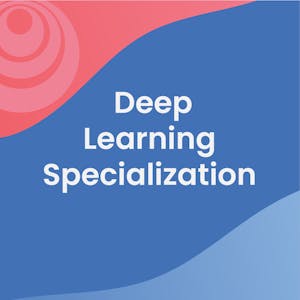The Deep Learning Specialization is a comprehensive program designed to equip learners with the knowledge and skills needed to excel in the rapidly evolving field of deep learning and artificial intelligence.
Through a series of five modules, participants will delve into the core concepts and practical applications of deep learning, gaining hands-on experience with cutting-edge technologies and strategies.
Upon completion, participants will be well-prepared to contribute to AI technology developments and pursue advanced career opportunities in this exciting and rapidly expanding field.
Certificate Available ✔
Get Started / More Info
The Deep Learning Specialization consists of five modules that cover foundational concepts, advanced techniques, and practical applications in deep learning and artificial intelligence.
In the first module, participants will delve into the foundational concepts of neural networks and deep learning, gaining a strong understanding of the technological trends driving the rise of deep learning. They will learn to build, train, and apply fully connected deep neural networks, and implement efficient (vectorized) neural networks, equipping them to tackle real-world applications with confidence.
The second module focuses on the intricacies of improving deep neural networks, offering insights into hyperparameter tuning, regularization, and optimization processes. Participants will learn best practices for training and developing test sets, analyzing bias/variance, and implementing various optimization algorithms, empowering them to systematically generate optimal results in deep learning applications.
Module three provides a comprehensive understanding of structuring machine learning projects, guiding participants in building successful machine learning projects and honing their decision-making skills as machine learning project leaders. Learners will gain expertise in diagnosing errors in machine learning systems, prioritizing strategies for error reduction, and navigating complex ML settings, preparing them for hands-on industry experience in AI development.
The fourth module delves into Convolutional Neural Networks (CNNs), shedding light on their evolution and exciting applications in computer vision. Participants will gain practical experience in building CNNs, applying them to visual detection and recognition tasks, and exploring the use of neural style transfer to generate art, expanding their capabilities in leveraging CNNs across various image, video, and 2D/3D data applications.
Module five explores sequence models and their diverse applications, from speech recognition to natural language processing. Participants will learn to build and train Recurrent Neural Networks (RNNs), apply them to character-level language modeling, and gain hands-on experience with NLP and Word Embeddings. Additionally, they will utilize transformer models to solve NLP tasks such as NER and Question Answering, expanding their skills in cutting-edge AI technologies.
Auto Machine Learning (AutoML) Using AutoGluon is a hands-on project focusing on leveraging AutoGluon to prototype and evaluate machine learning models for classification...
Feature Engineering en Français is a comprehensive course that delves into Vertex AI Feature Store, data transformation, feature extraction, and preprocessing methods...
Machine Learning with PySpark: Customer Churn Analysis
The PyTorch basics course provides a hands-on introduction to ML coding environment setup, PyTorch tensors, and neural network module usage.